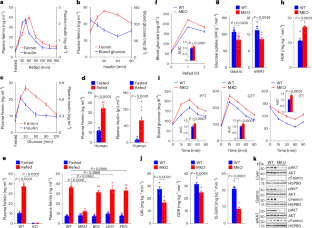摄食诱导的肌因子调节葡萄糖稳态
IF 18.9
1区 医学
Q1 ENDOCRINOLOGY & METABOLISM
引用次数: 0
摘要
在禁食和进食期间维持血糖稳态对于预防可能导致低血糖或高血糖的失调至关重要。在这里,我们发现由一个功能未知的基因编码的feimin(小鼠中的B230219D22Rik,人类中的C5orf24)是葡萄糖稳态的关键调节剂。Feimin在摄食过程中由骨骼肌分泌,与受体蛋白酪氨酸激酶Mer (MERTK)结合,通过激活AKT促进葡萄糖摄取并抑制葡萄糖生成。给药feimin和胰岛素协同改善血糖稳态在正常和糖尿病小鼠。值得注意的是,MERTK基因中的特定单核苷酸多态性(rs7604639, G> a)导致feimin - MERTK结合区域的氨基酸替换(R466K),导致人类与feimin的关联降低,餐后血糖和胰岛素水平升高。我们的研究结果强调了feimin-MERTK信号轴在葡萄糖稳态中的作用,为糖尿病的潜在治疗途径提供了有价值的见解。本文章由计算机程序翻译,如有差异,请以英文原文为准。


A feeding-induced myokine modulates glucose homeostasis
Maintaining blood glucose homeostasis during fasting and feeding is crucial for the prevention of dysregulation that can lead to either hypo- or hyperglycaemia. Here we identified feimin, encoded by a gene with a previously unknown function (B230219D22Rik in mice, C5orf24 in humans), as a key modulator of glucose homeostasis. Feimin is secreted from skeletal muscle during feeding and binds to its receptor, receptor protein tyrosine kinase Mer (MERTK), promoting glucose uptake and inhibiting glucose production by activation of AKT. Administration of feimin and insulin synergistically improves blood glucose homeostasis in both normal and diabetic mice. Notably, a specific single nucleotide polymorphism (rs7604639, G>A) within the MERTK gene, causing an amino acid substitution (R466K) within the feimin–MERTK binding region, leads to reduced association with feimin and elevated postprandial blood glucose and insulin levels in humans. Our findings underscore a role of the feimin–MERTK signalling axis in glucose homeostasis, providing valuable insights into potential therapeutic avenues for diabetes. The authors identify feimin as a feeding-induced myokine that regulates glucose homeostasis via the MERTK–AKT signalling axis in mice and humans.
求助全文
通过发布文献求助,成功后即可免费获取论文全文。
去求助
来源期刊

Nature metabolism
ENDOCRINOLOGY & METABOLISM-
CiteScore
27.50
自引率
2.40%
发文量
170
期刊介绍:
Nature Metabolism is a peer-reviewed scientific journal that covers a broad range of topics in metabolism research. It aims to advance the understanding of metabolic and homeostatic processes at a cellular and physiological level. The journal publishes research from various fields, including fundamental cell biology, basic biomedical and translational research, and integrative physiology. It focuses on how cellular metabolism affects cellular function, the physiology and homeostasis of organs and tissues, and the regulation of organismal energy homeostasis. It also investigates the molecular pathophysiology of metabolic diseases such as diabetes and obesity, as well as their treatment. Nature Metabolism follows the standards of other Nature-branded journals, with a dedicated team of professional editors, rigorous peer-review process, high standards of copy-editing and production, swift publication, and editorial independence. The journal has a high impact factor, has a certain influence in the international area, and is deeply concerned and cited by the majority of scholars.
 求助内容:
求助内容: 应助结果提醒方式:
应助结果提醒方式:


